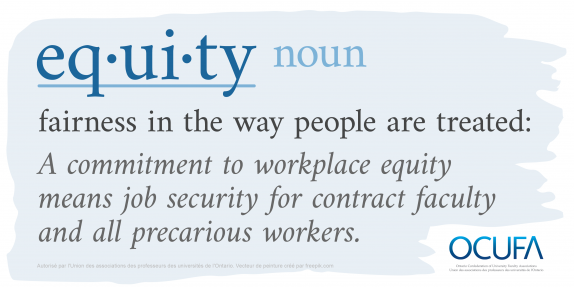
TORONTO, March 9, 2022 – Universities across Ontario have increased their focus on equity, diversity, and inclusion initiatives in recent years. However, without commitments to improve job security, pay, and benefits for contract faculty and other precariously employed campus workers, these initiatives will fall short. Contract faculty, who routinely make less than their securely employed colleagues when doing work of equal value, are disproportionately women and individuals from equity-deserving groups.
“Today, university faculty, staff, and students from across Ontario will be making their voices heard and demanding fairness for contract faculty on social media,” said Sue Wurtele, OCUFA President. “University administrations must do more than proclaim their commitment to equity, they need to put an end to Ontario faculty working contract-to-contract with low pay and no benefits.”
It is one thing for university presidents to claim that equity is important, but it is a very different thing for university administrations to roll up their shirtsleeves and engage with the campus community to do the work needed to address the unfair treatment of so many campus workers.
These changes are broadly supported by Ontarians. Polls have shown that they believe universities should be model employers and improve working conditions for contract faculty by paying them fairly, expanding access to benefits, and providing them with better job security.
“We may be precariously employed, but term-after-term and contract-after-contract we show our commitment to our students and our universities in the work we do,” said Kimberly Ellis-Hale, Interim Chair of OCUFA’s Contract Faculty Committee. “If Ontario’s universities are committed to equity, they need to show that commitment to us—not with empty words but with action.”
An institutional commitment to equity means little if work is not being done to improve the working conditions of campus workers employed in short-term contracts. Ontario’s universities should take immediate steps to improve job security, pay, and benefits for contract faculty and their precariously employed colleagues.
Founded in 1964, OCUFA represents 17,000 faculty, academic librarians, and other academic professionals in 31 member associations across Ontario. It is committed to enhancing the quality of higher education in Ontario and recognizing the outstanding contributions of its members towards creating a world-class university system. For more information, please visit the OCUFA website at www.ocufa.on.ca.
-30-
For more information, contact:
Ben Lewis, Communications Lead at 416-306-6033 or communications@ocufa.on.ca




